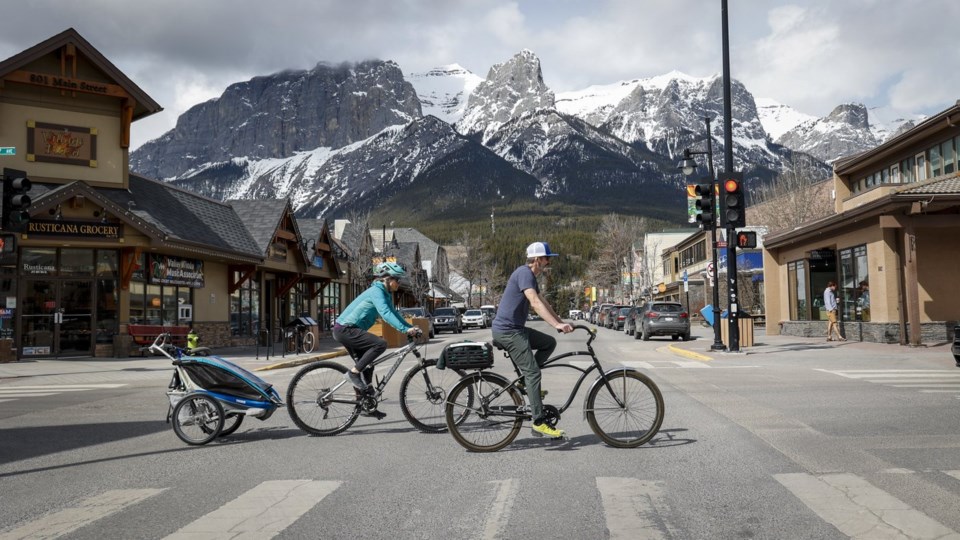CALGARY — The ripple effect of the wildfire that devastated the town of Jasper last summer could continue to reverberate through Alberta's tourism sector in 2025, industry insiders say.
At the Charming Inns of Alberta — a group of privately owned small inns with locations throughout the province — operators in Banff, Lake Louise and Canmore are preparing for a busier-than-normal summer.
These already-crowded Rocky Mountain destinations could get even more crowded if travellers who would otherwise have visited Jasper look for alternate itineraries instead, said Charming Inns marketing director James Hague.
"Certainly, in 2024, we saw quite a bit of pickup in Banff, Lake Louise and Canmore (due to the Jasper fires)," Hague said.
"And it's unfortunate, but we would expect a little bit of pickup in 2025 as well."
Jasper National Park — traditionally saąúĽĘ´«Ă˝'s second-most visited national park and home to attractions like the Columbia Icefield — made international headlines in July when a fast-burning wildfire ripped through the area.
One-third of the buildings in the park's historic townsite were damaged or destroyed. Visitation to Jasper, which reached an all-time high of 2.48 million people in 2023, fell to near-zero in the month of August, according to ATB Financial.
Jasper is rebuilding, and both the park and townsite are open for business heading into 2025. But visitors planning a trip there are being encouraged to confirm beforehand which services will be available.
While many hotels survived the fire, a few were completely destroyed, meaning Jasper will not have the same capacity to welcome overnight guests as it did before the disaster.
"I think our hotel operators anticipate that we will get some overflow (this summer) from people who had planned to go to Jasper and can't find capacity there," said David Matys, vice-president of destination development with Banff & Lake Louise tourism, though he said the uptick will likely be small.
Banff is saąúĽĘ´«Ă˝'s oldest and most-visited natural park, located approximately 280 kilometres southeast of Jasper. The park's visitation has grown 31 per cent over the last decade to 4.28 million visits last year, making 2023/24 Banff's busiest year on record.
In its park management plan posted on its website, Parks saąúĽĘ´«Ă˝ says congestion and crowding are increasing concerns, both in the town of Banff itself and at nearby attractions like Lake Louise and Moraine Lake where traffic control personnel are required 24 hours a day to manage capacity.
In the summer of 2023, approximately 1,800 vehicles per day were turned away from Lake Louise due to over-capacity, according to Parks saąúĽĘ´«Ă˝.
Clara-Jane Blye, a post-doctoral fellow in kinesiology, sport and recreation at the University of Alberta, said all of Alberta's parks and outdoor recreational areas have seen a significant uptick in visits in the wake of the COVID-19 pandemic.
She said it's wise for businesses at already-popular Rocky Mountain destinations to prepare for additional tourists as Jasper works to rebuild.
She also said it's a good idea for Alberta to promote some of its lesser-known destinations this summer, which could help ease the burden on popular sites like Banff and Lake Louise.
But Blye said while some tourists will likely choose to avoid Jasper, others may seek it out on purpose.
"There's some really cool research on this idea of empathy-based tourism, which suggests people will want to visit Jasper to show solidarity and support," Blye said.
"I think we could potentially see some of those people visit Jasper or areas around Jasper and not necessarily be displaced into Banff."
Hague, with Charming Inns, said the town of Canmore, located just east of Banff on the Trans-saąúĽĘ´«Ă˝ Highway, is also preparing for more visitors next year because of the G7 summit set to take place in nearby Kananaskis Country. He said Canmore and other mountain towns may need to work harder this summer to ensure they're prepared for higher volumes.
"I would imagine you'll see (businesses) offering a little bit higher wages and benefits, or season-end bonuses for team members to entice them to stay the full season," he said.
"That's the kind of thing I'm hearing and seeing."
But in iconic Banff, Hague said tourism operators are already accustomed to dealing with an annual stampede of visitors and are likely to take any additional increase in 2025 in stride.
"In Banff, it's just one level of chaos to another. It's just busy every year," Hague said.
"Whether you're 95 per cent or 98 per cent occupancy, it's not a huge difference operationally."
This report by The Canadian Press was first published Dec. 15, 2024.
Amanda Stephenson, The Canadian Press



